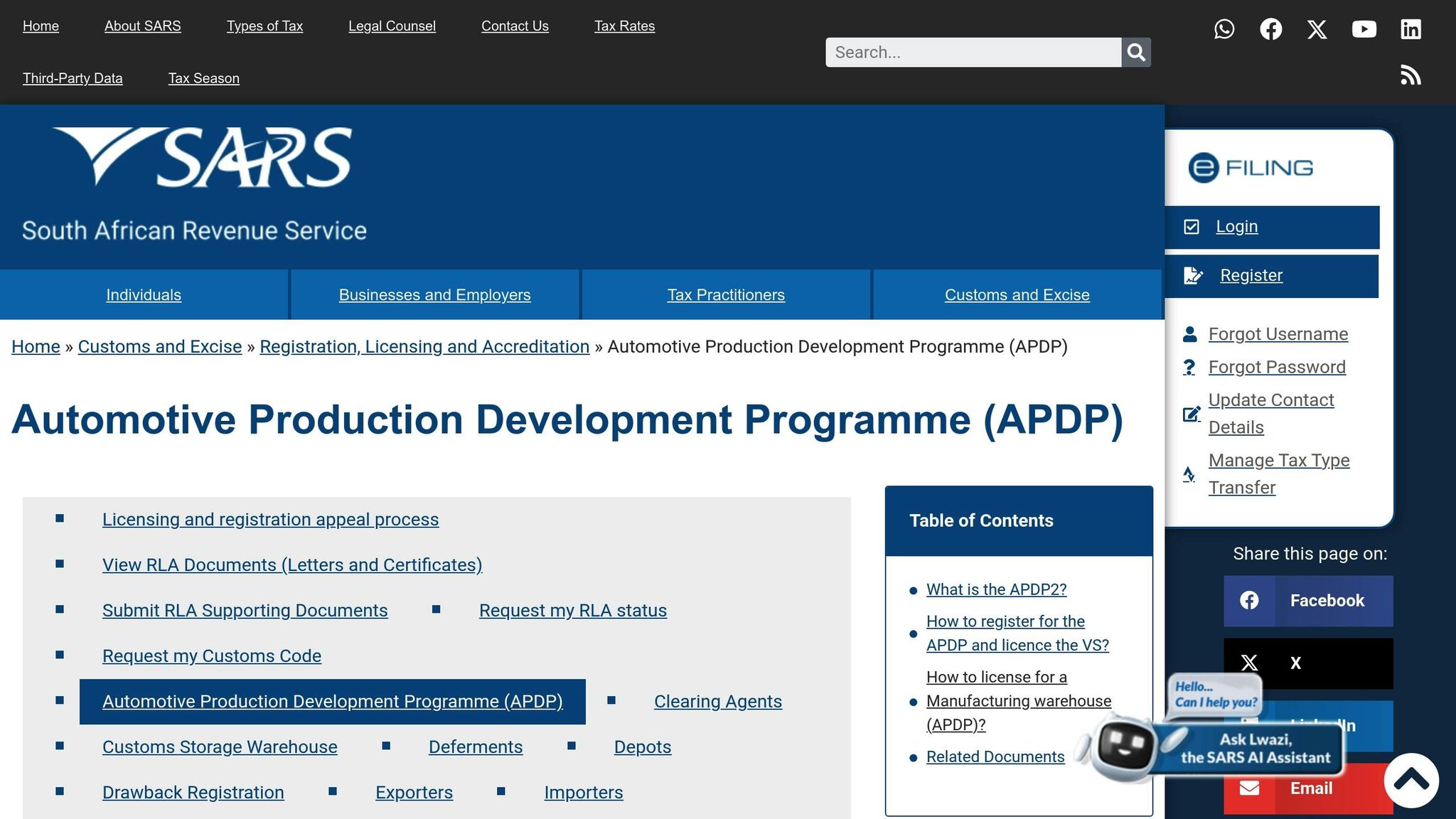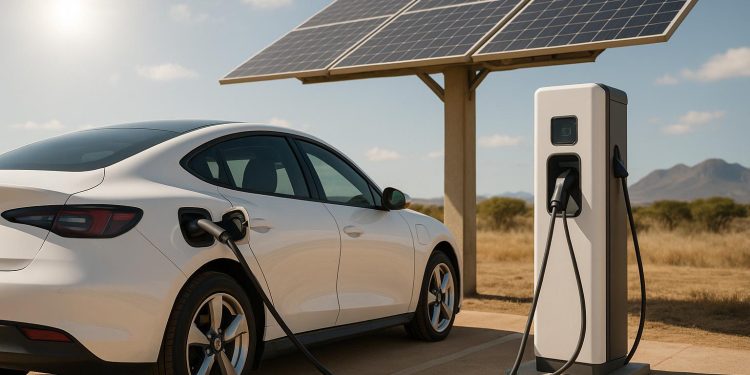South Africa is pushing for cleaner transportation with policies that promote electric vehicles (EVs) and renewable energy-powered charging stations. The 2023 EV White Paper outlines plans to cut emissions and establish charging networks using solar and wind energy, while tax incentives and adjusted import regulations aim to lower EV costs and encourage renewable energy integration. However, challenges like frequent load shedding and uneven grid upgrades hinder progress, leaving many charging stations reliant on the unstable national grid.
Key points:
- EV charging stations are concentrated in major cities, limiting access in rural areas.
- Load shedding disrupts charging reliability, urging a need for on-site renewable energy solutions with battery storage.
- Tax incentives and reduced import duties aim to boost EV adoption but lack clarity on long-term impact.
- Public-private partnerships and grid improvements are critical for expanding renewable-powered charging infrastructure.
South Africa’s EV policies show promise but require stronger strategies to address energy reliability and infrastructure gaps.
Nick Singh on EV Charging, Smart Microgrids & Energy Innovation | Eskom South Africa
Key Policies Driving EV Adoption and Renewable Charging
South Africa is making strides in encouraging the adoption of electric vehicles (EVs) while promoting renewable energy-powered charging solutions. These policies aim to create a supportive environment for EV growth while aligning with the country’s renewable energy goals. Here’s a closer look at the measures shaping this transformation.
The 2023 EV White Paper and Its Role
The 2023 Electric Vehicle White Paper lays out a detailed plan to cut transportation emissions and establish charging networks powered by renewable sources like solar and wind. A standout feature of this policy is its focus on grid independence for charging infrastructure. It requires on-site renewable energy generation combined with battery storage, ensuring that charging stations genuinely contribute to reducing emissions.
Tax Benefits and Adjusted Import Regulations
South Africa’s tax policies are geared toward making EVs more accessible and encouraging investments in clean energy charging solutions. Reduced import duties help lower the cost of EV ownership, while tax incentives provide financial support for developing renewable-powered charging infrastructure. Additionally, import regulations have been fine-tuned to prioritize equipment that integrates with renewable energy systems, further supporting the country’s sustainability goals.
Automotive Production and Development Program (APDP)

The Automotive Production and Development Program (APDP) plays a critical role in fostering local EV manufacturing while also expanding renewable energy-based charging networks. This initiative underscores South Africa’s commitment to a more sustainable automotive future.
Renewable Energy Integration in Charging Networks
South Africa’s efforts to weave renewable energy into its electric vehicle (EV) charging networks face a tough road, primarily due to persistent grid reliability issues. While there’s growing interest in using renewable energy to make charging more dependable, the country still lacks detailed policies to guide these efforts.
Public-Private Partnerships in Charging Infrastructure
Collaborations between the government and private companies hold the potential to strengthen EV charging networks. These partnerships could help address infrastructure challenges, including renewable energy integration. However, clear frameworks or joint initiatives aimed at incorporating renewables into charging stations are scarce. Alongside these partnerships, advancements in technology are essential to ensure the reliability of charging networks.
Grid Upgrades and Renewable Energy Solutions
One proposed solution is on-site renewable energy generation paired with battery storage at charging stations. This approach could help mitigate the impact of grid outages, especially during load shedding. However, progress on grid upgrades remains uneven across regions, and there’s no requirement mandating new charging stations to include renewable energy systems. Without a comprehensive strategy, these upgrades face significant hurdles.
Challenges in Renewable Charging Integration
Frequent load shedding disrupts EV charging schedules, leaving many drivers in a bind. According to ImotoNews South Africa in May 2025, these outages pose serious challenges for EV users who depend on consistent access to charging stations. To cope, some EV owners are turning to alternatives like installing solar panels at home, ensuring they can keep their vehicles running even during grid disruptions.
How Policies Affect EV Market and Charging Access
South Africa’s approach to EV policies plays a key role in shaping the market and expanding access to renewable charging. However, there’s still limited information on how tax incentives and import regulations influence EV affordability and the availability of charging options. This lack of clarity highlights the need to examine how charging infrastructure is distributed and priced.
Charging Infrastructure Growth and Location
Currently, EV charging stations are heavily concentrated in large cities like Johannesburg, Cape Town, and Durban. Most of these rely on the national power grid, which creates an imbalance in charging access across the country. The economic differences between regions could further slow the spread of these facilities, particularly in less affluent areas.
Cost and Access to Renewable Charging
The financial side of renewable charging solutions remains a challenge. Without clear policies – such as tax breaks or subsidies for renewable-powered stations – it’s hard to gauge the cost burden on both operators and EV owners. On top of that, the absence of standardized pricing for EV charging makes it tricky for consumers to estimate their long-term expenses. These issues underscore how much policy decisions affect the broader EV ecosystem.
ImotoNews South Africa will keep tracking updates on EV policies and the development of renewable charging infrastructure.
sbb-itb-09752ea
South Africa vs. Global Benchmarks
South Africa’s electric vehicle (EV) policies fall short when compared to global standards. In countries with stable power grids, EV charging is consistent and reliable. Here, however, load shedding disrupts renewable energy charging networks, presenting a significant challenge.
The 2023 EV White Paper marks a step in the right direction, but ongoing energy supply problems call for urgent infrastructure improvements and customized policy solutions. Strengthening grid stability is key to enabling renewable energy-powered charging networks to flourish. ImotoNews South Africa monitors how shifts in policy and infrastructure are influencing the country’s EV landscape. These differences offer a foundation for evaluating future policy changes.
Strengths and Weaknesses of Current Policies
South Africa’s policy framework for EVs shows both potential and limitations when compared to international benchmarks. On the positive side, the emphasis on integrating renewable energy into charging infrastructure reflects a forward-looking mindset. However, execution remains a challenge. Frequent grid reliability issues hinder the effectiveness of these policies, creating obstacles that more established EV markets have managed to avoid.
Tax incentives and adjustments to import regulations hint at innovative policy efforts, but their actual impact on market growth is still unclear. Without detailed data on EV adoption rates and infrastructure development, it’s hard to gauge their success. This uncertainty underscores the need for stronger policy evaluation tools to help South Africa keep pace in the global shift toward electric vehicles.
Future Outlook and Recommendations
South Africa’s journey toward a thriving electric vehicle (EV) market faces some hurdles, but strategic changes could pave the way for progress. One major challenge is the country’s unreliable power grid. Frequent load shedding not only disrupts EV charging but also complicates efforts to integrate renewable energy sources and encourage EV adoption.
Suggestions for Policy Changes
Addressing load shedding is essential to building a stable EV ecosystem. Policies aimed at improving grid reliability and ensuring charging stations remain functional during power outages can make a big difference. These measures would provide consumers with greater confidence in EVs while supporting the use of renewable energy for charging.
Conclusion
South Africa’s push toward electric vehicles is promising, but the success of these policies heavily depends on resolving ongoing grid challenges. While the country’s EV strategies aim to spark change, the frequent power outages caused by load shedding continue to limit their effectiveness.
For EV adoption to thrive, a dependable power grid is non-negotiable. Developing solutions that can withstand outages is crucial to unlocking the potential of electric mobility in South Africa. Without a stable energy infrastructure, even the most well-planned initiatives will struggle to deliver consistent results.
FAQs
What steps is South Africa taking to address load shedding and ensure a reliable charging network for electric vehicles?
South Africa is grappling with load shedding, which poses a significant challenge to the reliability of electric vehicle (EV) charging infrastructure. To tackle this issue, the country is turning to renewable energy sources like solar and wind to power charging networks. By incorporating these alternatives, the reliance on the traditional power grid decreases, offering a cleaner and more dependable solution.
Another key focus is the development of battery storage systems. These systems store surplus energy generated from renewables, ensuring it’s available during power outages. Together, these initiatives aim to build a more resilient and accessible EV charging network, even in the face of ongoing energy supply disruptions.
What tax incentives and import regulations are outlined in South Africa’s 2023 EV White Paper, and how could they shape the future of EV adoption?
The 2023 EV White Paper highlights several policies designed to boost the adoption of electric vehicles (EVs) in South Africa. Among these are tax incentives aimed at cutting down the cost of owning an EV and updated import regulations intended to bring more affordable EV models into the local market.
Over time, these strategies could make it easier for consumers to switch to EVs while also encouraging the development of charging networks powered by renewable energy. By linking these policies to sustainability objectives, South Africa has the potential to move closer to a future of cleaner, greener transportation.
How are public-private partnerships driving the growth of renewable-powered EV charging networks in South Africa?
Public-private partnerships are essential for growing renewable-powered EV charging networks in South Africa. These partnerships bring together government backing – through policies and incentives – with the private sector’s ability to innovate and invest, paving the way for sustainable charging infrastructure.
This collaboration ensures charging stations are both widely available and powered by renewable energy, such as solar or wind. The result? A reduced environmental footprint for EVs and meaningful progress toward South Africa’s shift to cleaner energy solutions.
Related Blog Posts
- EV Buyers in South Africa: Emissions and Behavior
- SA’s First Solar EV Charging Stations: What to Know
- Are South Africans Ready for the EV Revolution?
- Kenya’s EV charging rollout inspires South African planners





